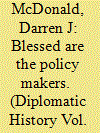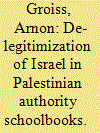| Srl | Item |
| 1 |
ID:
139162


|
|
|
|
|
| Summary/Abstract |
President Jimmy Carter’s pursuit of a faith-based foreign policy caused his early frustrations with the Middle East peace process. He initially pursued a comprehensive, regional settlement. The administration worked toward reconvening a Geneva conference focused on ending the Arab–Israeli conflict. Carter was guided in these efforts by his religious beliefs, specifically his understanding of Christian social justice. As a result, Carter viewed the situation of the Palestinians as one of the most significant human rights challenges he faced in the region and began championing the cause of the people in the West Bank and Gaza as he attempted to secure them a place in Geneva. After the likelihood of a conference collapsed, Carter, in effect, began negotiating directly with the Israeli government on behalf of the Palestinians. Those efforts cost him much political support and caused the peace process to stagnate.
|
|
|
|
|
|
|
|
|
|
|
|
|
|
|
|
| 2 |
ID:
113996


|
|
|
|
|
| Publication |
2012.
|
| Summary/Abstract |
De-legitimization of Israel as a sovereign state and denial of the Jews' rights, indeed of their legitimate presence in Palestine in both antiquity and today, have been the cornerstone of the Arab position since the onset of the Middle East conflict. Even the peace agreements between Israel and some of its neighbours - Egypt (1979), the PLO (1993), Jordan (1994) - have not changed this attitude, as starkly illustrated by schoolbooks of the nations concerned. This essay describes the depiction of the Jewish state in Palestinian Authority (PA) schoolbooks in comparison to Arab, Iranian, and Israeli textbooks.
|
|
|
|
|
|
|
|
|
|
|
|
|
|
|
|
| 3 |
ID:
111566


|
|
|
|
|
| Publication |
2012.
|
| Summary/Abstract |
In August 1962, the Kennedy Administration secretly sold Hawk missiles to Israel. To the chagrin of many American officials, the arms sale became public one month later. This revelation had a profound impact on Arab-American relations. Alongside the American military intervention in the Lebanon crisis of 1958, the Hawk sale solidified the cultural process in which the United States became an "imperial" power in Arab-Muslim imaginations. Through its perceived sponsorship of Israeli militarism, the United States was deemed guilty of empire by association. Washington's open association with Israel led many to perceive Tel Aviv as an agent of the American Empire.
|
|
|
|
|
|
|
|
|
|
|
|
|
|
|
|
| 4 |
ID:
122065


|
|
|
|
|
| Publication |
2013.
|
| Summary/Abstract |
Jerusalem's status has remained indeterminate since the approval of the UN General Assembly Resolution 181 in November 1947. Following the 1948 war, the US acknowledged de facto Israeli and Jordanian control in their respective sectors of Jerusalem, but refused to recognize Western Jerusalem as Israel's capital. After Israel captured the Old City during the 1967 Six Day War, the question of the city's status became a focus of US and British concern. The two states formulated a variety of proposals regarding the future of the city and the holy places. In the end, however, they realized that no agreed formula could be found, and therefore they refrained from taking a clear stand on the issue and did not offer the UN and the belligerents a comprehensive plan.
|
|
|
|
|
|
|
|
|
|
|
|
|
|
|
|
| 5 |
ID:
113864


|
|
|
|
|
| Publication |
2012.
|
| Summary/Abstract |
Following costly military defeats political elites usually attempt to persuade their publics that the battlefield outcome was not a shameful defeat but a 'moral victory'. Yet, only sometimes their public accepts these claims. The paper tries to explain this variation in the domestic publics' perceptions in the cases of non-democratic entities. It is argued that the key variable that determines actors' success in claiming a moral victory is the existence of certain battlefield elements, or at least symbolic military acts/achievements of the defeated actor which can persuade his public that these battlefield elements existed. Propaganda efforts to misrepresent the battlefield facts can play only a secondary role and only under certain conditions.
|
|
|
|
|
|
|
|
|
|
|
|
|
|
|
|